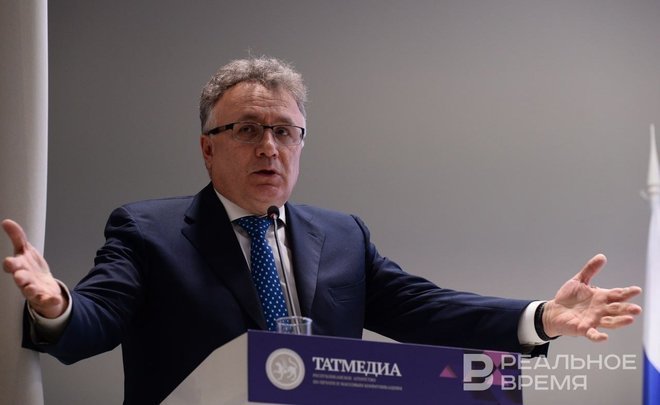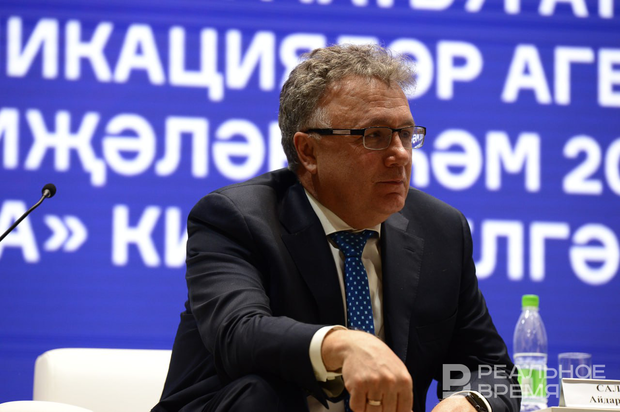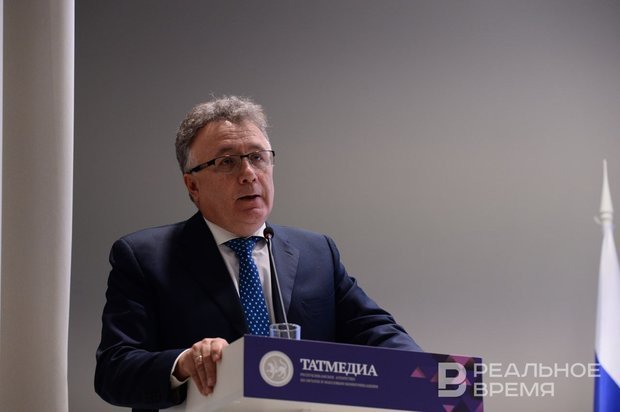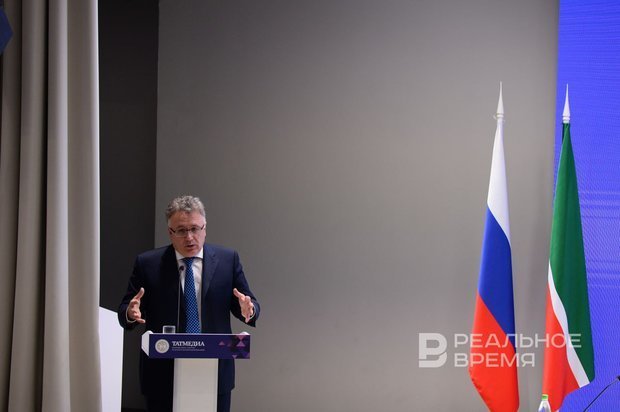Ilshat Aminov: ‘Doing journalism means doing something that not everyone likes’
Chairman of the Union of Journalists of Tatarstan on the main problems of the media industry

Low salaries remain the main problem in journalism. Among others — there have become fewer big names, the training of professional personnel is bad, and it is difficult to get new equipment and technologies. This was stated by the director general of Novy Vek TV channel, chairman of the Union of Journalists of Tatarstan and deputy of the State Council of the Republic, Ilshat Aminov, at the board meeting of the Republican Agency for Press and Mass Communications Tatmedia. Realnoe Vremya provides a transcript of his speech.
“In fact, we are both a trade union, and social welfare department, we also perform funeral services”
In fact, when Asgat Akhmetovich (Safarov, the chief of Staff of the President of Tatarstan — editor's note) came into the hall, a young girl ran up to him with a microphone and said: “Asgat Akhmetovich, what do you think, you see, print media and television are losing popularity, only the Internet is everywhere. How do you feel about this?" Well, she's still young, she doesn't understand that everything has already changed. Things have been different for a long time, and we have been different for a long time. I also wanted to tell her: “We'll meet again on the Internet, wait.” It's not a threat, it's just a suggestion.

I wanted to say that the Union of Journalists of the Republic of Tatarstan, of course, is now a multifaceted, very important, very necessary organisation. I understand that now. In fact, we are both a trade union, and social welfare department, we also perform funeral services. But I am very glad that this year we have a real content, that is, the contest that Aydar Saitgaraevich (Aydar Salimgaraev, the head of the Republican Agency for Press and Mass Communications Tatmedia — editor's note) spoke about, we have distributed almost 5 million to editorial offices, not only state, but also and on private ones. It was a good project. Of course, I, Asgat Akhmetovich, wanted such projects to continue. We should gather in this hall, we should have a fair of proposals, a fair of ideas, and we should give these grants to the best talented, young colleagues so that they can realise their boldest ideas.
The first problem is low salaries
Of course, I would like to outline, here I have written four problems that we have today before the industry and about which I am obliged to say. Of course, the most important problem is still the problem of wages. Aydar Saitgaraevich, I'm sorry if I don't say it, you don't say it, I have to say it. Because the average salary in the industry today, I asked my colleagues, is somewhere on average 30 thousand rubles. I think it's not entirely fair. When I started as a journalist in the State Committee for Television and Radio Broadcasting, I received a salary of 130 rubles and earned a fee of 100 rubles. I received 230 rubles, then it was a very good salary, believe me, it's 230 thousand rubles today. When I went on vacation, they gave me almost 500 rubles, I took my whole family to Sochi, I felt like a king. Anyway, I want this feeling to come back to me as soon as possible (the audience clapped)!
But this does not mean that I just came here [to say]: “Asgat Akhmetovich, give me money.” Of course, we must work more efficiently, we must show our activities, we must make it more understandable for the authorities, for the population, and for all those people who make decisions. I hope that you will agree with this.
The second problem is fewer well-known names
Another trend that certainly worries me as chairman of the Union of Journalists is that we are getting fewer names for some reason. That's when I started working, again, I came to the editorial office of Zelenodolskaya Pravda for practice, where Venera Yakupova led social topics, and Sergey Fedotov led the topic of industry — such venerable journalists who, in general, taught us professional skills. And there was a lot to learn from them, believe me. This is from the editorial office of Zelenodolskaya Pravda, I emphasise. Just today, this lack of names, of course, let's remember the names of Fedotov, Nikolaev, Shevchuk, Riman Gilemkhanov, Gabdelkhat Rizvanov, Ayrat Arslanov, Elena Chernobrovkina, Anvar Malikov — they are here, in the hall these names.

We must make sure that conditions appear — of course, these are financial, creative, and technological opportunities — so that such names appear, because in this raging information world today people are guided only by such islands that they trust. There should be more of these islands, and we should create them.
The third problem is cadres
Well, of course, the chief has already said, we will discuss the problem of personnel training. The trend is such that there is convergence, we are already very seriously tightening the qualification requirements for journalists. I wrote out for myself, that is, in addition to working for the main publication, they must produce news materials for online resources, a website, social networks, upload audio and video to the Internet, shoot video reports, assemble, if necessary, on the phone, post on all platforms, take photos, process them, upload to the Internet, promptly work on a computer, make information and visual excerpts, navigate the Internet, make news reports, anticipating the main material, use all kinds of computer image processing programmes, pass information immediately to the room and to the website, conduct all kinds of blogs, select high-quality data and facts, be available at any time of the day (clapping began in the hall). Today, this is the task of every journalist. Everything, the edges of radio, television, newspapers, magazines are being erased — everyone is engaged in video, everyone is engaged in distribution, and so on.

Of course, Aydar Salimgaraevich, I have a proposal for you — of course, we should get together, work out some new qualification requirements. To work them out, to fix them on paper, to hand them over to our colleagues at the university so that we can train the specialists we need today. These are high-tech people, they should be able to do a very large amount of work.
The fourth problem is technical equipment
And finally, the last one. Of course, we need new technologies for data collection, processing and transmission. We are lagging behind in this, I am also talking about myself. I dream of virtual studios, capacities for the production of operational cartoons and TV series. I am glad that the powerful Tatmedia project is being implemented, which will turn our republic into a new continuous information space. And, of course, I really want our journalists to have good working conditions. Here are examples given — these are Saby, we have been there, we will still be there in Buinsk. I would very much like that in Zainsk, in my favourite district, where the guys work literally in a goods store, in two rooms, I would like such editorial offices to end, because the new time requires new competencies. Naturally, people who do beautiful things should work in beautiful conditions.
In conclusion, I would like to tell my colleagues that a journalist who makes a story that only likes goes into business. I would not like to do show business. Cancan is, of course, great, but it's a different profession. That's why I urge everyone to do journalism — this means doing something that not everyone likes. Thank you!”